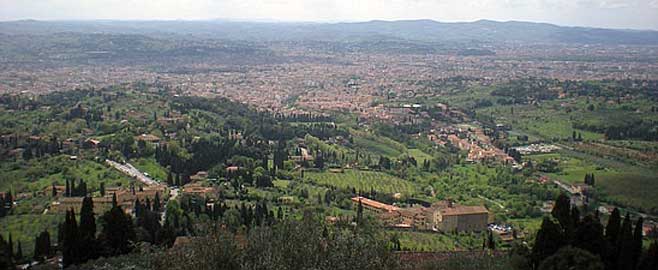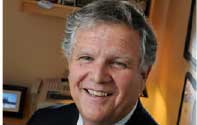Final Thoughts

By Lawrence Hergott, MD
 In her review of the Francine Prose book, The Lives of the Muses, Stacy Schiff mentions the few things of our time she feels serve as muses—things that inspire creativity in the arts and humanities. Being in love is listed, as is suffering. A third muse is
In her review of the Francine Prose book, The Lives of the Muses, Stacy Schiff mentions the few things of our time she feels serve as muses—things that inspire creativity in the arts and humanities. Being in love is listed, as is suffering. A third muse is
Fiesole is a small town in Tuscany, a few miles up a hill from Florence. Florence is a wondrous place, with its magnificent domed cathedral, the Uffizi Gallery and Michelangelo’s David. For the minority of travelers who go to Fiesole, another wonder awaits. Standing on the hilltop and looking back, the majesty of Florence is seen resting silent and enchanting in the valley below. It is a scene almost unbearably picturesque, imprinting—and inspiring.
Florence and Fiesole may offer a useful metaphor for physicians. We might consider our daily experiences of medicine as being in Florence: intense, meaningful, at times difficult. We could consider the view from Fiesole as stepping away from those immediate occurrences for a broader perspective—a view beyond the biomedical—of heart or soul experiences as we lead our lives in medicine.
Being in Florence, for example, means my being pleased that the emergency coronary bypass on a physician-patient of mine was successful, saving his life and preserving left ventricular function. The view from Fiesole would be learning later that he silently worried throughout his hospitalization about whether he would have any change in cognitive function or personality and, as an accomplished pianist, whether he would still be able to play Beethoven’s Moonlight Sonata from memory. The view from Fiesole would be my understanding the meaning for him of going straight to his grand piano upon returning home and playing the sonata through "by heart."
Being in Florence would be a cardiothoracic surgeon recognizing his excellence at his craft, and how his hard work was of great service to his patients and provided well for his family. The view from Fiesole would be his reflecting on that practice, recognizing it as a consuming one that stole him from his wife and daughters. The view from Fiesole came years later, after leaving that practice for one that was less remunerative but which allowed him to save his family.
Being in Florence would be any physician recognizing the hardships of practice and feeling discouraged. The view from Fiesole would be seeing the extraneous forces causing those hardships as "the single cloud that eclipses the sun" that Balthasar Gracian mentions in his
As physicians, we must spend our due time in Florence, and spend it well. As difficult as that can be, we—and others—will suffer more if we don’t occasionally take that metaphorical walk up the hill to Fiesole, look back and contemplate the wondrous, heart-and-soul experiences a life in medicine brings. Not to do so would be to make real the words Dr. William Carlos Williams offered in a poem: "It is difficult to get the news from poems, yet men die miserably every day for lack of what is found there."
Lawrence Hergott is a professor of medicine in the cardiology division.
Please submit your essays for future editions to Dan Meyers.